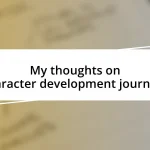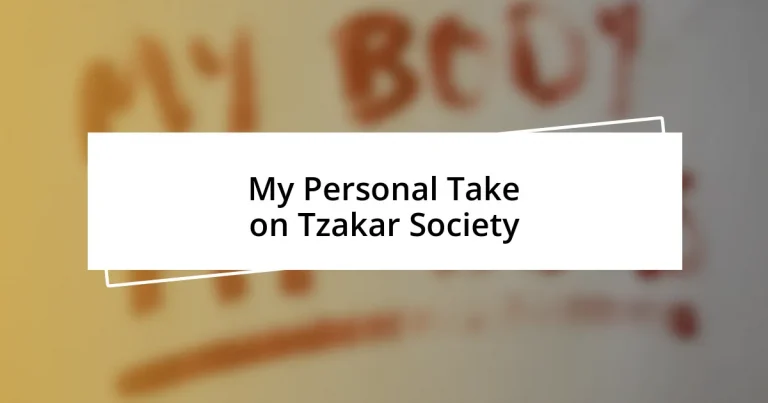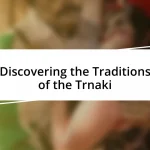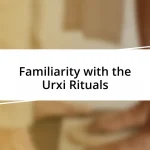Key takeaways:
- Tzakar Society highlights the importance of community ties and respect for elders, emphasizing a blend of spirituality and social cohesion through storytelling.
- The culture’s historical background reflects resilience, with oral traditions preserving heritage while adapting to modernization.
- Modern challenges include the impact of globalization on traditional practices, language preservation among youth, and the need to maintain community cohesion amidst socio-economic changes.
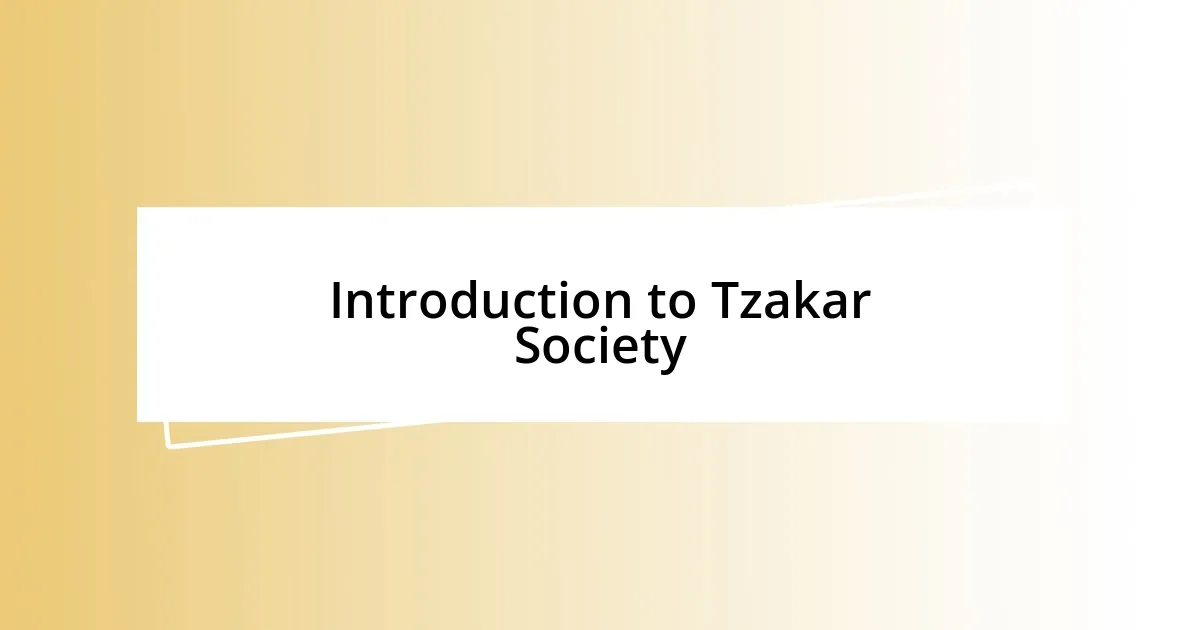
Introduction to Tzakar Society
Tzakar Society is a vibrant tapestry of customs and traditions that has evolved over centuries. When I first encountered their rich culture, I was struck by the intricacies of their community ties and the deep respect they hold for their elders. Isn’t it fascinating how traditions can shape our identities and connect us to our roots?
As I delved deeper into the nuances of the Tzakar way of life, I discovered a unique blend of spirituality and social cohesion. Individuals within this society often take turns narrating stories of their ancestry, which reinforces their sense of belonging. Have you ever experienced something that made you feel truly connected to your heritage? When I hear stories from my own background, I can’t help but feel a surge of pride and understanding.
The rituals and practices of Tzakar Society reflect not just a way of living, but a way of thinking about life and relationships. Everything, from their festivals to daily greetings, carries an underlying philosophy that emphasizes unity and respect. It makes me ponder how our actions and traditions can echo through time, shaping the future while honoring the past.
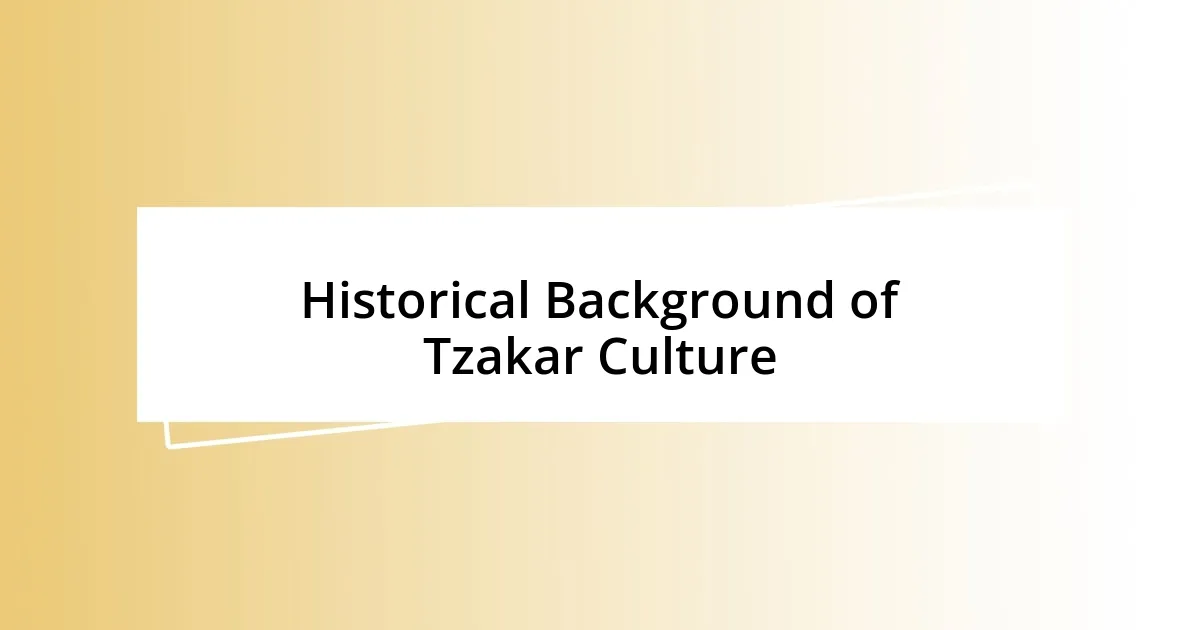
Historical Background of Tzakar Culture
Tzakar culture has roots that can be traced back to ancient civilizations, showcasing a rich tapestry of influences from various neighboring societies. I often reflect on the importance of history in understanding a culture; when I first learned about the Tzakar’s agricultural practices and rituals tied to the changing seasons, I felt a profound connection to how they harmonize with nature. It’s intriguing to consider how every harvest celebration echoes centuries of tradition, reinforcing community bonds that persist today.
As I explored the stories passed down through generations, it became evident that oral traditions play a vital role in preserving the Tzakar heritage. I vividly recall listening to a Tzakar elder recounting tales of legendary figures from their past during a community gathering; the ambiance was electric, and I could see the pride in everyone’s eyes. This experience cemented my understanding of how these narratives not only educate but also inspire the community, offering lessons woven into their identity.
Beyond just history, Tzakar society’s evolution reflects resilience and adaptability in the face of challenges. I’ve often contemplated the significance of adaptability, especially when I observed how they have embraced modernization while retaining core traditions. It reminds me of my own family’s journey; blending new practices while honoring our past has been an ongoing process filled with both joy and complexity. In reflecting on the Tzakar’s historical background, I see the real beauty lies in their ability to maintain a sense of continuity amidst change.
| Aspect | Description |
|---|---|
| Origins | Ancient civilization roots influencing the culture |
| Oral Traditions | Preservation of stories and histories through generations |
| Adaptability | Embracing modernization while holding onto traditions |
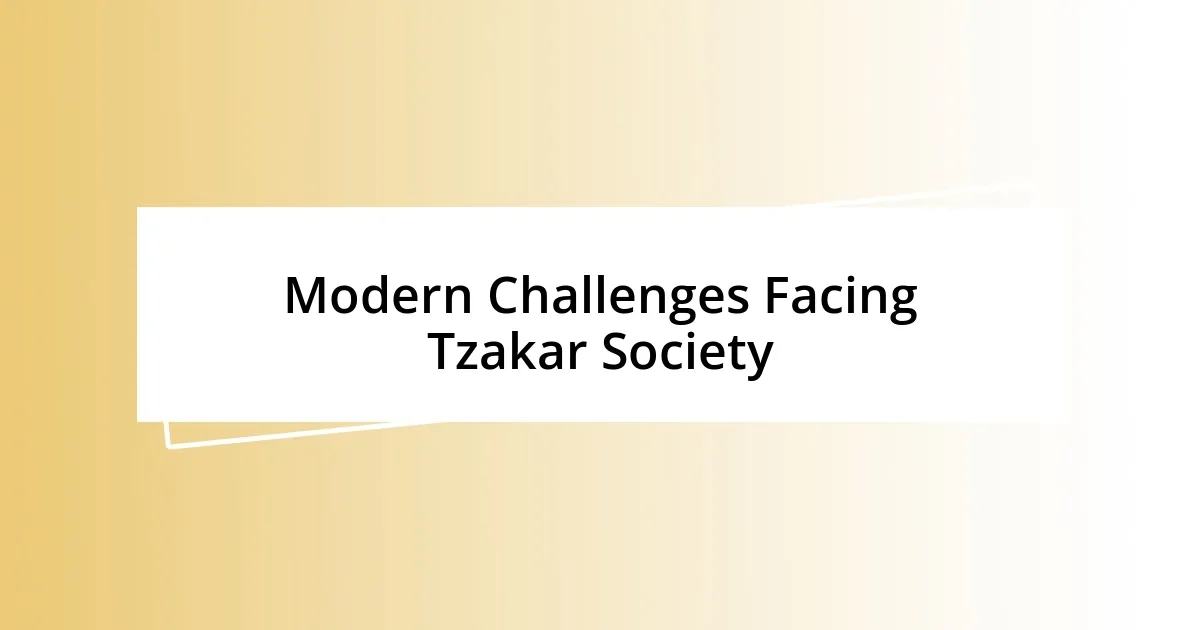
Modern Challenges Facing Tzakar Society
Modern challenges facing Tzakar Society are deeply intertwined with the impact of globalization. I’ve often marveled at how quickly the world around us changes, and the Tzakar community is no exception. As younger generations gravitate towards urban living and modern technologies, I can’t help but wonder how this shift affects their connection to traditional practices. Have you seen this happen in other cultures? For me, it raises questions about balancing progress with preserving heritage.
Another significant hurdle is the preservation of language amidst these transformations. I remember sitting in a Tzakar gathering, where the elder’s traditional storytelling captivated everyone. Yet, I noticed some younger attendees struggled to fully grasp the intricate dialect being spoken. Isn’t it alarming to think how a culture’s very words could fade away? This struggle highlights the urgent need for initiatives that encourage language retention among the youth, fostering a stronger link to their identity.
Lastly, socio-economic changes pose a challenge in maintaining community cohesion. During a recent visit, I felt a palpable shift in attitudes; the hustle for jobs and modern lifestyles seemed to overshadow traditional communal bonds. It made me reflect on how essential it is for societies to nurture connections, even as times change. I often ponder, how can the Tzakar implement strategies to reinforce these ties in an ever-evolving world? Balancing social progress while holding on to the essence of community spirit is undoubtedly a complex task ahead for them.




